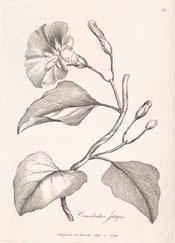
Bindweed, JalapBotanical: Convolvulus Jalapa (LINN.)---Synonym---Ipomea purga---Habitat---The Jalap Bindweed (C. Jalapa, Linn.), but more often called Ipomea Jalapa or purga, is a native of South America and Mexico. It derives its name from Xalapa, in Mexico, where it is very abundant. It is freely grown out of doors, however, in the southern countries of Europe, and plants have been grown here in the garden of the Society of Apothecaries and also in Norfolk and Hampshire.
---Description---It is a handsome climbing convolvulaceous plant with crimson flowers and a tuberous root, which is of officinal value. The tubers, varying in size from a walnut to an orange, are dark, umber-brown in colour and much wrinkled. They are imported either whole or sliced. ---Medicinal Action and Uses---The drug Jalap is prepared from a resin which abounds in the roots. It has a slight smoky odour and the taste is unpleasant, followed by pungent acridity. It has strong cathartic and purgative action, and is used in constipation, pain and colic in the bowels and general intestinal torpor, being combined, in compound powder, with other laxatives, and with carminatives such as ginger, cloves, etc. It accelerates the action of rhubarb. Jalap forms a safe purge for children, being given in sugar or jam to disguise the taste, and has been used thus with calomel or wormwood as a vermifuge. It proves an excellent purge in rheumatism. ---Preparations---Powdered root, 3 to 20 grains. Tincture, B.P., 1/2 to 1 drachm. Powdered resin, 2 to 5 grains. Compound powder, B.P., 1 to 2 drachms. Jalapin, 1 to 3 grains. Other members of this Convolvulus family have economic uses. C. dissectus, an American species abounds in prussic acid, the liquor known as Noyau being prepared from it with the aid of alcohol, and the oil of Rodium, which is so attractive to rats as to cause them to swarm to it without fear, even if held in the hand of a rat-catcher, is the produce of another Convolvulus, known as C. Rhodorhiza. One of the most important members of the order economically is C. Batatas, the tuberous-rooted Bindweed, or SWEET POTATO, the roots of which abound in starch and sugar and form a nourishing food, very valuable in the tropics, where it is largely cultivated. The roots are somewhat in shape like an oblong and ugly potato, often club-shaped, and are of a reddish colour. When cooked, they are excessively sweet, not unlike liquorice, and not attractive in appearance. They are usually of greater size and weight than ordinary potatoes. Before the introduction of the Potato into Europe, the Sweet Potato was regularly imported as a wholesome article of diet, and was grown in Spain and Portugal, to which it had been brought from the West Indies. The Potato which Shakespeare mentions twice - in the Merry Wives of Windsor and in Troilus and Cressida - is the Sweet Potato, and not the more familiar tuber of our days. [Top] © Copyright Protected 1995-2004 botanical.com
|
|
| GuestBook |
STUMBLE-UPON: NATIVE AMERICAN EMBASSY: HOME PAGE:

|
Copyright(s) © 1991-2012: Lenni Lenape Phoenix, Native American Embassy, Mandy & NATIVE ENIT, Native American Holocaust Museum, Inc., Minister Jessie Renee (Von Noaker) ThunderWolfe, Priscylla Belle Venticello, Von Noaker Family Publishing Group International North American Homeless Ombudsman Council
Copying in any form or medium is strictly forbidden without prior written permission: Illegal copying (Taking Possession of) anything within this Web Domain contitutes "Criminal Theft of (Intelectual) Property & will be treated as such! |
|
|
|
VISITOR STATISTICS: TREEPAD
|
|
CONTACT INFORMATION: NATIVE AMERICAN EMBASSY 1413 Union Avenue McKeesport, Pennsylvania 15132 USA PHONE: [VOICEMAIL ONLY HOTLINE (News, Reports, etc.)]: (412) 436-3866 Pennsylvania, Pittsburgh Office: (412) 689-9051 Pennsylvania, Johnstown Office: Private: Auto Transfers To Hawaiian Office HAWAIIAN OFFICE & MAIN NORTH AMERICAN (U.S.) OFFICE: (808) 445-6576 NEW YORK OFFICE: (631) 913-3475 OKLAHOMA OFFICE: (405) 225-6124 |
|

